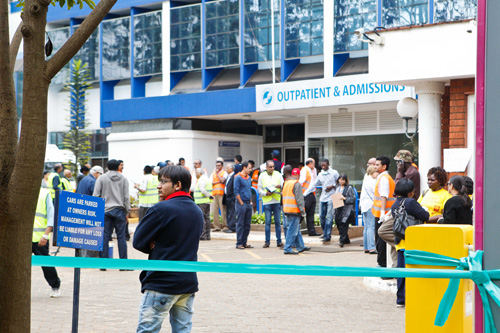Tackling security concerns in Nairobi
|
 The M.P. Shah Hospital in Nairobi. The son of the Chinese national who died during the attack is being treated here after injured in the terorist attack launched by the Somali militant group Al-Shabaab in a shopping mall. [Photo/Xinhua] |
How the Chinese community and businesses in Kenya are reacting to terrorist attacks in Nairobi
The Chinese community in Kenya is growing increasingly concerned about the security situation in Nairobi after the Somali militant group Al-Shabaab launched a terrorist attack in a fancy, crowded shopping mall on September 21, killing at least 72 people – including five terrorists, six security officers and one Chinese national – as of September 24.
Many people believe it will deal a heavy blow to the local economy, especially to tourism. It will also have an influence on social stability in the area and potentially tarnish the image of Kenya overseas.
"Tourism will be the first sector to suffer," said Li Qiang, General Manager of the China Road and Bridge Corp. in Kenya, while talking to Beijing Reivew.
The number of Chinese visitors to Kenya has been increasing over the last decade after China declared Kenya an approved destination for Chinese tourists in 2004. Tourism plays a very important role in the Kenyan economy. It is one of the major sources of income and revenue generated by it spills over to other sectors of the economy, including transport, industry and agriculture.
Some countries have already issued travel alerts warning against travel to Kenya in the aftermath of the tragedy. The Chinese Embassy in Kenya warmed Chinese citizens already in the country to avoid going to crowded public places and to pay special attention to their safety.
"The number of Chinese tourists to Kenya will definitely drop drastically," said Li.
Li is concerned about social order in Kenya following the attack. Chinese people working in Nairobi, just like Li, have been enjoying living in Nairobi, as the situation is different from working in some other African nations.
Many Chinese employees tend to bring their family members to Kenya with them after they settled there. Some arrange for their children to attend international schools in Nairobi. After the terrorist attack occurred, many are considering sending their children back to China.
"Only 10 out of the 18 students in my daughter's class showed up today," Li said. "Her teacher did not call to ask about their absence either. I think it might be hard for her to demand a reason, because the answer could turn out to be heartbreaking news."
Many children died in the attack. When it happened, there was a cooking competition for children on the third floor, said a Chinese visitor who was trapped in the supermarket for more than five hours. "I feel sorry for the children who died there."
A Chinese woman died during the attack at the upscale Westgate Mall in Kenya's capital. Her child was also injured, and currently receiving treatment in hospital. The Chinese Embassy in Kenya and representatives from Chinese businesses based in Nairobi visited the child on September 23.
"The child is suffering a lot," Yuan Tianci, a Chinese employee working in Nairobi, told Beijing Review. He visited the child in the M. P. Shah Hospital.
The Chinese Ambassador in Kenya, Liu Guangyuan, also went to the hospital to see the child and asked Kenya to spare no effort in treating the injured, helping Chinese citizens deal with the aftermath, and taking effective measures to ensure the safety of Chinese nationals and organizations in Kenya.
Meanwhile, Chinese companies in Nairobi have also strengthened security measures. According to Li, his company attaches importance to the security of its entire workforce, both Chinese and Kenyan. In the wake of the terrorist attacks, the corporation's headquarters in Beijing will soon send security experts to Kenya to evaluate the situation and implement solutions to possible security concerns.





















